Middlesbrough: The impact of collaboration
Lessons learned from a co-produced programme addressing gendered and child poverty in Middlesbrough. July 2024.
- Published
- 02/10/2024
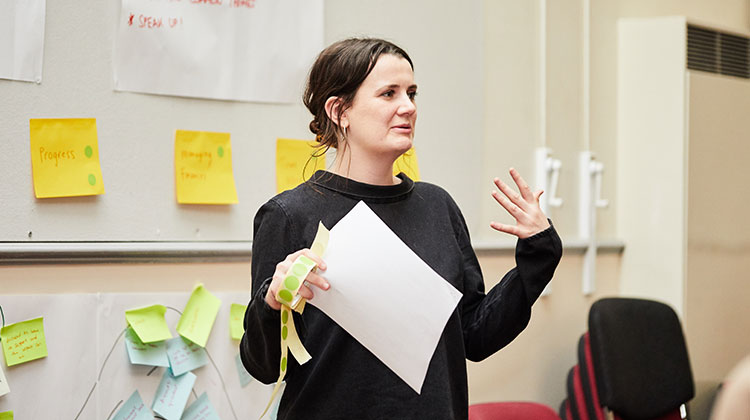
Impact on our own organisations
Introduction
Buttle UK, The Smallwood Trust and Turn2us are three national organisations who support individuals and families who are experiencing financial insecurity.
Since 2021, we have been working together in the Newport area of Middlesbrough, alongside community organisations and local women with children, to tackle the root causes of gendered and child poverty by creating a collaborative programme that tests the effectiveness of a co-produced approach to grant making.
This report is intended for grant makers and organisations that are seeking to improve the lives and outcomes of the communities they work with through collaboration.
In this report we outline how we have worked together over the initial years of the collaboration, what practical impacts the collaboration has achieved, and the useful insights we’ve gained. Our aim is to help other organisations understand and apply effective collaborative strategies to achieve better results for the communities they support.
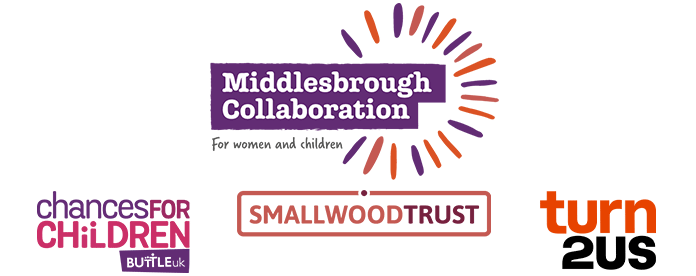
Why collaborate?
The idea to collaborate first evolved from the Grant Makers Alliance (GMA) - a network of like-minded individual grant makers, who wanted to challenge some of the more paternalistic and traditional elements of the sector.
We knew, as single organisations, we could not end gendered and child poverty, so we wanted to understand what the potential impact could be if we worked together - we wanted to know what happens if we combine our resources, experience, and expertise into our programmes.
We also know that women are disproportionately affected by poverty, with studies consistently revealing higher poverty rates among women compared to men, especially in households headed solely by women.
Additionally, children are increasingly more likely to live in poverty than the rest of the population. Given the strategic focus and expertise of the Smallwood Trust, Buttle UK and Turn2us – we decided to focus our efforts on supporting women and their children.
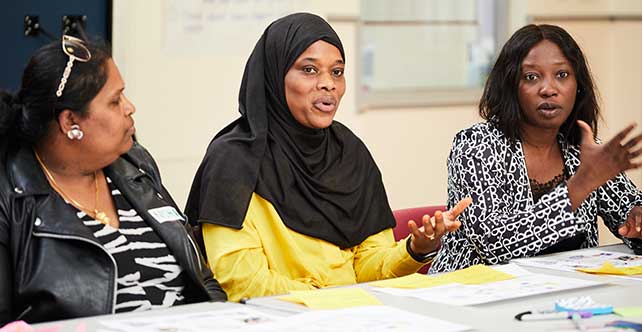
How have we worked together?
Early on, we knew we needed to spend time together to agree on ways of working and to explore what the collaboration could look like. Over a year, we ran a series of workshops with senior leadership at Buttle, Smallwood and Turn2us to understand the change we wanted to see and communicate any redlines or no-go areas.
It became clear that to align each organisation’s Articles of Association, for example Buttle only being able to support children, young people and their families, and Smallwood only being able to support women, this Collaboration could only support women and their children.
Whilst the target areas of each organisation have not held the programme back, if anything they’ve added value, this has been something we’ve referred to as we’ve delivered the programme.
Timeline
- Autumn 2021: Collaboration between Buttle UK, Smallwood Trust and Turn2us established and a programme of grantmaking and systems change agreed.
- February - March 2022: Programme Manager hired, Middlesbrough is identified as key area for the delivery of the programme and Middlesbrough programme on Gendered Poverty is launched.
- August – November 2022: Community Partners, Ubuntu Multicultural Centre and Creative Minds Middlesbrough, selected to be delivery partners.
- January – July 2023: Grant fund co-designed with co-production partners and community partners.
- August 2023: Community Coordinator appointed.
- September – December 2023: Grant round 1 delivered (£50,000 to 25 women with children).
- January – March 2024: Grant round 1 evaluation conducted.
- November 2023 – March 2024: Systems change mapping project delivered.
We established a programme Steering Group, made up of two representatives from each organisation, to give strategic oversight of the programme and agree the collaboration principles.
These are:
- Co-production.
- Honesty.
- Accountability - to each other, co-production partners and women in poverty.
- Partnership working – creating equitable and deep relationships with each other and the people we work with.
- Commit to intersectional feminist values.
- Shared decision-making.
Inception phase
Between February 2022 - Augusts 2023, the Collaboration, led by a Programme Manager hosted at Turn2us, ran the Inception Phase. In this time, we identified where we were going to work, built connections with local women and community organisations and co-designed and delivered our first pilot project.
However, the key part of the Programme Manager role was to build the collaboration and the ways we could work together. We’ve summarised the way we’ve worked together below:
- We agreed each organisation would contribute the same amount of money - over the same period. £350,000 each across three years.
- We all contributed equally to the costs of a Programme Manager and Assistant. We used one organisation for line management and HR processes, but all programme staff are accountable to all three funding organisations.
- The Programme Manager was based in one organisation (Turn2us) this might mean the host organisation had more influence over the programme so we ensured the other organisations would Chair the steering group on rotation and organised regular catch ups with steering group members and the Programme Manager.
- The Programme Manager wrote key updates and met regularly with Steering Group members.
- In the first year, the Steering Group met monthly to receive regular updates about the programme. Now the Steering Group meets quarterly in-person for more strategic discussions.
- The Steering Group travelled to Middlesbrough in September 2022 and January 2023 to meet with local partners and see the places in which we’re working.
- Staff from all three organisations have worked on the programme e.g., designing and facilitating workshops, contributing to the monitoring, evaluation and learning framework and writing comms.
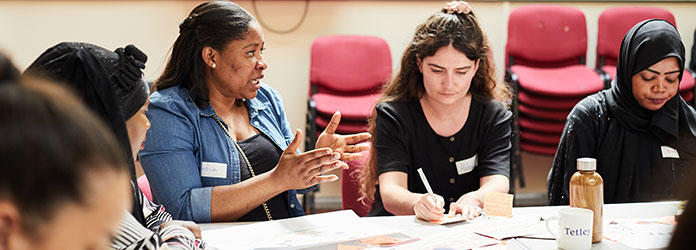
What we’ve learnt so far in Middlesbrough
Linking gendered and child poverty
Gendered and child poverty are inextricably linked. Gender inequalities in income, education, and employment opportunities can directly impact the socio-economic outcomes and wellbeing of children. Often, these two issues are treated in isolation with programmes of support focused either on women or children and young people.
By working together, we bring focus to the interconnected issues, ensuring that our programmes are shaped by the voices of women and their children as well as tailored to their needs.
Pooled funding leads to deeper and more meaningful solutions
By combining our resources, we have significantly increased the programme budget to over £1 million, all dedicated to addressing issues in Middlesbrough.
Each funding partner contributed £50,000 to the Inception Phase and an additional £300,000 over the following three years. This substantial investment allows us to implement larger-scale projects and develop more comprehensive solutions, effectively combating gendered and child poverty in the area.
Collaboration enhances programme design and collective impact
Our ambitious programme could not have been achieved by any single organisation alone. By pooling our funds, we harness the collective expertise and experience of three organisations, which enhances our programme design and broadens our impact.
This collaborative approach goes beyond traditional grant-making to include co-production, systems mapping, capacity building, and engagement with a diverse range of organisations that support women and their children. Together, we create a more effective and impactful programme.
Increased reach and more targeted response
We recognise that poverty disproportionately affects women and their children, especially when intersecting with other inequalities such as race, disability, and caregiving responsibilities. By collaborating, we have pooled our data and insights to develop a more comprehensive understanding of gendered and child poverty.
This partnership has enabled us to design and target our programme more effectively, ensuring that the groups most impacted are at the heart of our efforts.
Ability to draw on each other’s skillset and expertise and connections
We know we’re not experts in everything – nor should we try to be. Smallwood’s expertise in capacity building women-led organisations, Buttle’s experience in evaluating grants and Turn2us’s experience in working in co-productions brings additional specialisms that we can in turn share with our local partners.
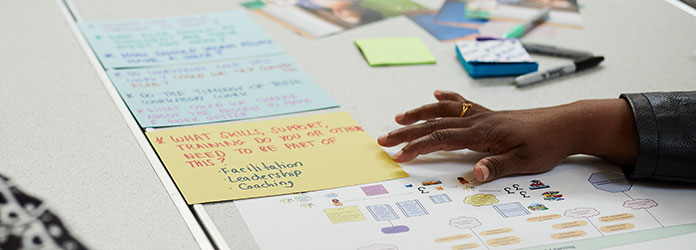
What’s been hard
Joint financial processes
- Resolving financial processes took two years, complicated by the initial advice that we were required to pay each other VAT, which would have made the programme unviable.
- Ensuring accuracy before combining funds was critical due to the significant financial stakes involved.
- Identifying the appropriate VAT contact was a prolonged and challenging process.
- Interim cost-splitting among the three organisations required extensive tracking and coordination due to differing financial processes and fiscal years.
- Consolidating all funding into a single pot at Turn2us in March 2024 has finally streamlined the programme budget and reduced administrative workload.
Advice we would give to others
When setting up a collaboration where you will all contribute financially, make sure you get advice from a specialist law firm who has worked on this issue before. Generic law firms may not know the niche area of law that allows collaboration between charities.
Prioritise this from the beginning, even if you are keen to get on with your programme as it will save a lot of time going forward.
Triple reporting
- Keeping Boards of Trustees and staff updated was time-consuming, requiring the preparation of multiple reports and attendance at various meetings.
- Despite basing updates on Steering Group reports, the need to tailor them to each organisation’s schedule often necessitated monthly reporting.
- Aligning each report with the distinct focus, vision, and strategy of each organisation added to the complexity.
Scheduling meetings
- Coordinating schedules among different CEOs, Directors, and Heads was particularly challenging.
- Pre-scheduled meetings frequently required rescheduling, necessitating extensive coordination across organisations.
Aligning the programme with organisational aims
- Aligning the programme with the strategies and visions of all three organisations proved complex despite an agreed collective aim and principles.
- Communicating certain programme aspects, such as capacity building by Smallwood, which is not done by Turn2us and Buttle, posed challenges to staff and Boards.
Slower than expected progress
- Programme activities progressed slower than expected due to the need to establish new processes for management, reporting, and compliance, with some challenges, such as VAT management, taking over a year to resolve.
- Building relationships with local organisations in Middlesbrough took longer than expected. We quickly learned that being physically present in their familiar spaces and receiving introductions from trusted sources were essential for breaking down barriers.
Advice we would give to others
It has been helpful that all the organisations have been prepared to be flexible, and their boards have been supportive of giving the programme time to develop. Make sure your boards and senior leadership are comfortable for a programme to take longer than normal to accommodate the complexity of collaboration.
Make sure you have dedicated administrative capacity to support the running of the collaboration, not just project delivery. Coordinating minutes, notes, meetings etc can be time consuming.
Each organisation should give clear red lines before the programme starts e.g. ‘we absolutely cannot fund x or y, and it is imperative we have this type of impact’.
Joint decision-making
- While generally smooth, some disagreements on the programme’s direction did occur.
- The Steering Group valued input from the Programme Manager and community organisations.
- Defining abstract concepts, such as the programme’s approach to systems change, lacked clarity, complicating consensus and direction-setting.
Advice we would give to others
We changed the steering group meetings from monthly to quarterly and made them longer. We shifted the focus to be more about the strategic direction rather than the programme delivery. The longer meetings and clear agendas which looked to get strategic input has helped move the programme along.
It took over a year of workshops and trust building before the project even started. These workshops, facilitated by and external facilitator helped create strong relationships between the organisations which meant we could be honest with each other and has meant there is little conflict.
Sometimes conflicts happen, it is normal! We are lucky to have a very pragmatic steering group members who were always happy to thrash out a problem or disagreement. Often it turned out that once a conflict had been aired, it wasn’t that much of a problem and could be moved on from very quickly.
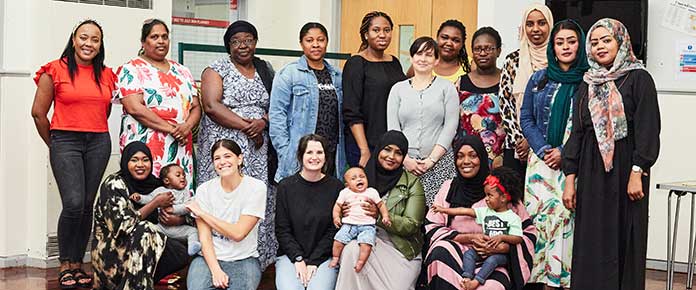
Impact on our own organisations
Peer learning
By working together, we have created a space to share learning, experience, and best practice, beyond the programme design and delivery.
As part of the monthly steering group meetings, we keep space to discuss wider organisational updates and challenges such as around governance, Equity, Diversity, Inclusion & Belonging (EDIB), research, networks, fundraising and recruitment. The collaboration offers a space in which each organisation can share new approaches and concepts and work through ideas with peers.
Improved partnership approach
By testing and learning within this collaboration, we have improved our general approach and practices to partnership working. We’ve learned the importance of having a strong vision and principles that ground our work, especially when cutting through the challenges that can hold us back (especially those challenges outlined above).
Designing and aligning new processes
We’ve developed new policies and processes from working together, for example developing joint approaches to working in co-production, splitting budgets across the collaboration and cross-organisational work.
We’ve also designed a new lone working policy to reflect the nature of this work. Each organisation has changed certain policies along the way and it’s a powerful message to send to the wider sector:, in order to collaborate you must be flexible.
Being brave
For all of us, this collaboration, was the first multi-year, place-based, co-produced programme that we have run. Learning from this has been a catalyst for other areas of work in our own organisations.
We have encouraged each other to be braver, and take risks, knowing we have each other’s support. We’ve also improved future work - new place-based programmes have been launched at Turn2us and Smallwood and are being designed with learning from this collaboration in mind.
Holding uncertainty
This collaboration has taught us the challenge and power of holding uncertainty. When we came together, we had no idea what the programme would look like. We had to work with our different Boards of Trustees to be prepared to fund a project with little to no understanding of how the programme would unfold. We received in-principle commitments from the Boards of Buttle, Smallwood, and Turn2us.
Increased influence in the sector
In September 2023, the Collaboration won ACO’s Collaboration of the Year award. This not only reflected the time and resource each organisation put in to strengthen the organisation but has also given us all an increased opportunity to influence the sector.
We want to challenge the paternalistic elements of the sector to test more innovative approaches to grant making that centres co-production and shifting power. We hope, over time, we can use our collective influence, alongside our community partners, to advocate for systemic change.
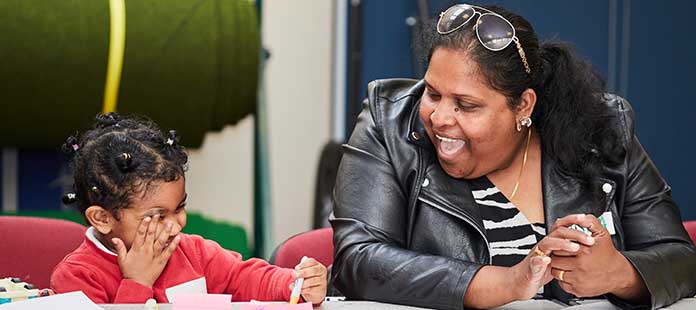
Conclusion
Working as a collaboration is not straight forward - it takes time to establish a collective vision and understand ways of working that bring the strengths and expertise of each organisation – before even beginning to design projects on the ground.
That being said, working as a collaboration has had a huge impact, not just on how we co-design solutions to end gender and child poverty in Middlesbrough, but also on our own individual organisations.
We extend our gratitude to our co-production partners, and community partners, Ubuntu Multicultural Centre and Creative Minds, for generously sharing their insights and experiences on the systems that contribute to financial insecurity for them, their families and their communities.
Further reports from our Middlesbrough collaboration
An evaluation of our co-produced grant fund for women and children
Understanding what causes poverty for women and their children in Middlesbrough